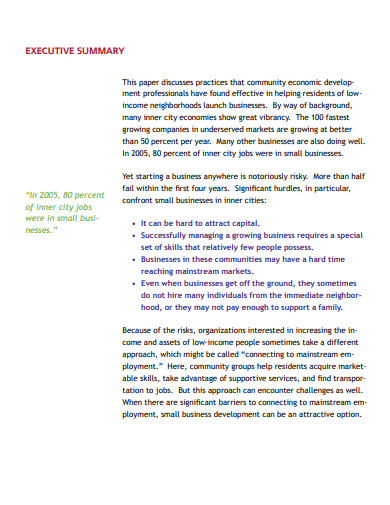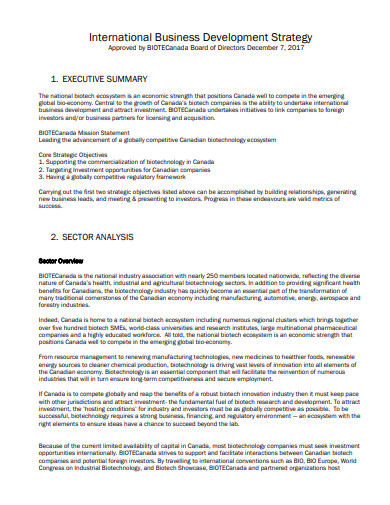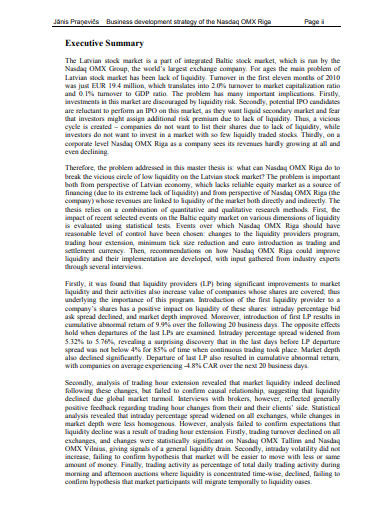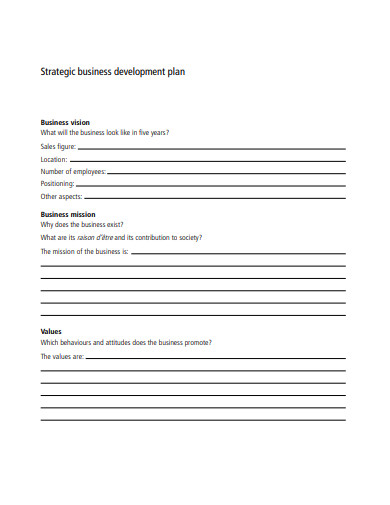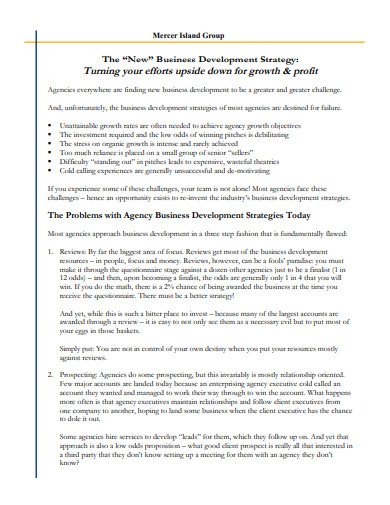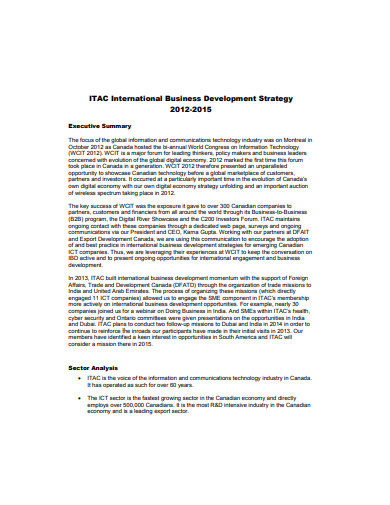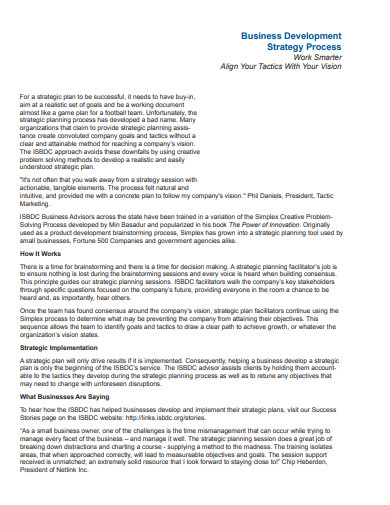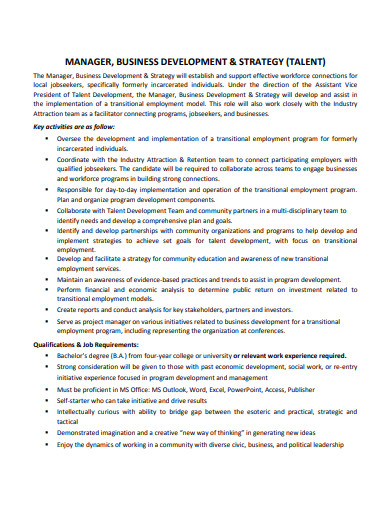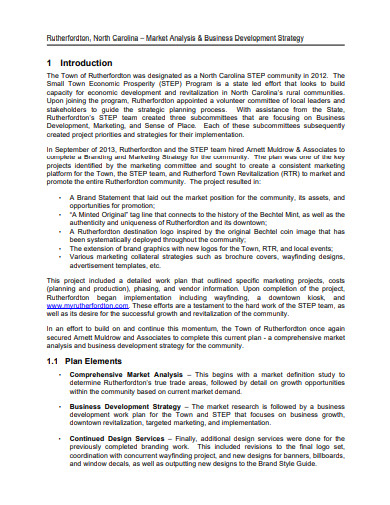Did you notice how the business industry is evolving at a fast pace? Today, many new businesses are constantly entering the business world along with their fresh and state of the art business strategies. According to a Statista report, there were 92,217 new businesses in the US back in 2016. Imagine how much more will be added in 2020 with the help of newly developed technology. In all of these circumstances, how does an entrepreneur keep up with the changes and the newly established competitors? Well, a business development strategy would be needed so that they can adapt to the ever-changing business industry. In this article, you will learn all about business development strategy, its importance, and how to create a business development strategy that will make your business grow.
[bb_toc content=”][/bb_toc]
12+ Business Development Strategy Examples
1. Small Business Development Strategy
2. Business Development Strategy
3. Business Development Strategy Format
4. Business Development Strategy Plan
5. International Business Development Strategy Plan
6. New Business Development Strategy
7. International Business Development Strategy
8. Business Development Strategy Process
9. Business Development Strategy Example
10. Sample Business Development Strategy
11. Business Development Strategy Plan Format
12. Business Development Growth Strategy
13. Business Development Strategy Plan Example
What Is a Business Development Strategy?
A business development strategy is the strategic planning of making a business achieve its organizational goals. It is also used to create or discover ideas for the growth of revenue and to manage business competitors. The process of making a business development strategy needs to be analyzed and planned carefully since it is the core of how a business will obtain its target market. Entrepreneurs need to establish a good business development strategy since it is an action plan in making a business grow successfully amongst its competitors.
Importance of a Business Development Strategy
The information listed below is the basis of why a business development strategy is essential for any business.
1. It is used as a basis for the decision-making of a business.
2. It is a helping hand in determining which part of the business has the most strength and weaknesses.
3. It helps an entrepreneur in keeping up with the latest business trends.
4. It is a tool in crafting a well-designed business plan.
5. It helps in expanding the business growth and assessing the competitors’ market.
Is It Difficult to Design a Business Development Strategy?
It depends on the situation of the business. If a business is facing a lot of organizational issues, then building a business development strategy would be quite difficult. There are many factors to consider in crafting a business development strategy since it inlvolves the overall components of a business. An entrepreneur must carefully examine which business element needs the outmost attention in order to implement possible solutions so that a business development strategy can be immedately built.
How To Create a Business Development Strategy
There are many templates available online for a business development strategy, but if you want to create you own, here are some steps and guidelines to follow:
1. Know Your Competitors
It is important to know the scale of your business competitors. This will determine how you will surpass their target market and create more trendy business ideas. It is important that you know your competitors since new businesses are constantly rising and to keep up with the new trendy business ideas of the business industry.
2. Listen To The Latest Trends
There are a lot of new business trends in the market because of consumer demands. Consumers always want something new and out of the ordinary. If you keep up with the consumers demands, then you might reach the market goals of your business. Before you answer the demands of the consumers, you must strategize how your business will do it. Analyze your business development and see the visual of how your business will keep up with the consumer demand.
3. Establish Key Performance Indicator (KPI)
Aside from measuring the employee performance indicators, you should also establish one for your business. KPIs are key in making a business development strategy because you will know which and what factors your business must have and determine the strengths and weaknesses of your business.
4. Enhance Customer Relationship
It is important to maintain a relationship with your customers to expand your company or organization’s business development strategy. Customers may bring useful information regarding competitors or the latest products in the market that your business might need. Maintaining good relationships with customers is also good for your business since they are also the source of bringing in potential customers.
5. Always Have The Time
When you are creating your business development strategy, you must always have the time for it. It is a critical factor that deals with the overall corporate strategy of the business. Allot time to carefully plan the business development strategy, schedule department meetings, personally talk with the managers, and incorporate employee engagement activities to increase productivity.
FAQs
Do I Have To Know The Types of Strategies?
Yes, there are different types of strategies for a business. These are the Corporate Strategies, Stability Strategies, Retrenchment Strategies, Business Level Strategies, etc.
How Do I Become Successful in Business Development?
For you to be successful in business development, you have to constantly learn, be open-minded in developing business strategies, and be resourceful in obtaining useful information for your business.
What Skills Do I Need To Have For Business Development?
The skill that you need to have for business development are communication skills, marketing skills, analytic skills, and project management skills.
Business development strategy plays an important role in steering any business towards a successful growth of the business revenue and in managing business competitors. Entrepreneurs need to come up with a strategic approach in achieving the organizational and corporate goals of their businesses. Seeing how fast the business industry is moving forward, entrepreneurs need to keep up by planning and creating an effective business development strategy.




